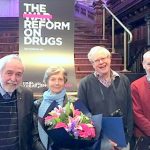Decriminalise Drug Possession: An Interview With Former AFP Commissioner Mick Palmer

Calls for reforms to the approach Australian governments take to illicit drugs are growing stronger. The idea that personal drug use and possession should be treated primarily as a health and social issue, and not a criminal offence, is starting to become commonplace.
And the push for drug law reform in this country is coming from some individuals and institutions that one would previously have not expected. The recent decriminalisation campaign Fair Treatment involved the Law Society of NSW and the NSW Bar Association and it was led by the Uniting Church.
One of the most vital and authoritative voices in the drug law reform debate at present is that of former Australian Federal Police commissioner Mick Palmer: a man who spend much of his life enforcing laws, some of which he now wants changed.
Mr Palmer had a law enforcement career that spanned over 30 years. He joined the Northern Territory Police Force in 1963 and became the NT Police commissioner in 1988. And for seven years he served as the head of the AFP, before retiring in 2001.
Today, Mr Palmer brings his wealth of experience at the frontline of enforcing drug laws to his current position as the emeritus director of the Australia21 think tank, which has released four forward-thinking reports on illicit drug policy.
Current laws cause harms
Australia21 has just released its fourth report on Australian drug policy We All Pay the Price, in which the participants of the roundtable call upon all Australian governments to decriminalise personal drug possession and use.
Another key concept to come out of the meeting held last March was that most Australians who use illegal substances will not experience any harm unless they come into contact with the criminal justice system.
The report also posits that current harsh drug policies and intractable social problems – such as homelessness and family violence – have “two-way interactions”. And reforms in drug policy would therefore positively impact these social issues.
Reducing the harms
In late September, Mr Palmer called for the roll out of pill testing trials at the launch of the Noffs Foundation Take Control campaign at the National Press Club in Canberra. However, he’s not only former senior law enforcement or law official suggesting such measures.
The third Australia21 drug report recommended implementing pill testing trials. And that roundtable included three other former police commissioners or assistant commissioners, two former heads of corrective services, a retired Supreme Court judge and a former Director of Public Prosecutions.
Sydney Criminal Lawyers® spoke to Mr Palmer about what led him to realise that the current law enforcement approach to drugs isn’t working, how decriminalisation would reduce harms and why pill testing trials are drastically needed.
Firstly, Mr Palmer, you’ve been involved in all four of the Australia21 illicit drug policy reports. What would you say is the significance of Australia21’s evaluations of local drug laws?
The opinions of a wide range of people are reflected in each of the reports. They’re based on roundtable discussions. Australia21 invites people from around Australia with a range of related, but in a sense, quite different backgrounds.
There’s academics, medical professionals: a whole range of people. There are police practitioners like myself and first responder practitioners like paramedics, who’ve had experience at the coalface in dealing with the reality of drug use and sometimes drug abuse.
They have a full day discussion and look at the good, bad and ugly of present policy and what you could do to improve it if the opportunity arose.
That’s been the basis of all the reports. But the difference has been the focus of the questions and the composition of the panel itself. The last one was 36 participants from a whole range of support agencies.
It’s always been a reflection of these people who have extensive experience in dealing with the problem. And the report remains their opinions, although it remains the property of Australia21. And this is what attracted me to them.
It is not a reflection of what Australia21 would like to achieve, but what the people believe is the problem and what might make a difference. That’s been the background of each of the four reports.
A key concept of the current report is that “the majority of people who use drugs will not experience harm unless they come in contact with the justice system.”
Many Australians who’ve been living under the current system of prohibition might find that concept hard to grasp. You were at the frontline of enforcing drug laws in the past.
Can you expand on why most Australians who use drugs don’t usually suffer harms unless they fall short of the law?
In my experience, the reality is that drug use in broad terms falls into two categories. There’s the social and recreational use of drugs. And the vast majority of people who do that are just middle-of-the-road decent Australian people, who very rarely come to the notice of police for any other reason.
Certainly, in my personal experience through knowing quite a number of these young people over the years, most of those people who use drugs recreationally – albeit that I prefer that they didn’t use them at all – do so without any harm to themselves.
They work their jobs and do their schooling. And they don’t suffer any medical problems or difficulties that you notice.
The reality is that most people who use drugs recreationally do it without long-term harm to themselves. They might have the odd high and low. But, they’re not doing much damage, unless they come to the attention of police and get arrested for use and possession. They’re unlikely to commit any other offence.
I worked with lawyers and other people in very high-level professions who I knew took drugs. And often very serious drugs, such as cocaine, which is reasonably popular with white collar people.
It didn’t appear to impact on the value of what they were doing, or the quality of the work they were doing. And it didn’t appear to impact on their health very much either, it seemed to me.
But, at the other end of the scale, you’ve got people who become addicted. Again, in my experience, they’re generally people who’ve got other problems that lead to their drug use in the first place. It then becomes drug abuse and addiction.
Whether it be broken families, homelessness, unemployment, medical dysfunction, schizophrenia and the like: there’s almost always an underlying cause that causes somebody to become – as is the same with alcoholics – caught in the drug framework.
Clearly, they are much more likely to come to the notice of police on account of prohibition laws because they are in disadvantaged circumstances.
They’re likely to commit those offences – the use and possession, the injecting of the drugs – in public. They’re likely to come to notice and attention. They’re likely to have to commit crime to pay for the drugs they want to buy, or, in regard to ice, on occasion, they may commit violence because of the drug that they’re on.
In numerical terms, that’s a very small percentage of the total drug use population.
I’m not trying to excuse drug use here for a moment. But, the premise is accurate, that the very vast majority of people who do use drugs wouldn’t come to the notice of police and wouldn’t suffer any material harm other than that caused by the criminal justice system. That’s quite an accurate statement.
The response of the Berejiklian government to the drug-related deaths of two young Australians at the Defqon.1 festival in September was to announce tougher drug laws.
These included a proposal of up to 10 to 25 years imprisonment for supplying someone with a drug that turns out lethal.
What’s your opinion of this response by the NSW government?
I felt saddened by it. I understand the difficulty in political terms. This isn’t an easy question. No government wants to be seen to be going “soft on drugs” to use their phrase. And parents and families are worried and concerned about drugs.
But, the huge deficit with the recent NSW policy was its high on punishment and very low on protection. You can’t punish your way out of this.
If ever we wanted evidence of the fact that prohibition doesn’t work, look at what’s now happening at festivals. I mean, all the sniffer dogs, all the prohibition, all the threats that have been made in the past and the high-level police presence doesn’t deter behaviour at all.
A very large number of young people who go to festivals decide to take the risk and have a night out partying on drugs, as well as on the music. It’s the nature of young people’s behaviour.
All young people take risks. I took them as a young person. Young people do that now. You do things, and you look back and think, “That was a risk. I should never have done that.” But, you do. It’s the nature of the beast.
We simply can’t punish or arrest our way out of this.
And I thought it was very sad for intelligent people, such as those involved in the NSW decision, to not be prepared to consider pill testing. Not to consider other initiatives that were much more likely to increase protection and safety, as part of the response to those deaths, which were tragic.
The main reason that people are dying at festivals – or anywhere else for that matter – is almost always that they didn’t understand the content or the toxicity of the drugs they bought from the black market, simple as that.
Had they known what they bought, they wouldn’t have taken them. And had they known what they bought, they almost certainly wouldn’t have died. They took something which wasn’t what they thought it was, as a consequence of which they died.
None of that is going to be changed by increasing the punishments.
You called for the roll out of pill testing trials at the launch of the Take Control campaign at the National Press Club.
What do you say to people who believe that pill testing somehow gives the green light to illicit drug use?
I say look at the evidence firstly. Wherever pill testing has been trialled – and it’s been trialled quite extensively in Europe – it’s had a very positive effect. I don’t know of a case where it is not supported by police.
It’s been seen to reduce drug intake levels. Having found out what’s in their pills, people have decide not to take them.
It gives a chance for interaction between medical professionals and other qualified people and the intended drug user, as to why they should think again about taking drugs in the first place. There’s a real chance for an educational interaction.
But, the main value is you’ve got some control over the toxicity of the drugs that people are taking. You’ve got an opportunity to improve the awareness of the risks involved in doing what they intended to do. It has to be a positive.
If we were prepared to look at that evidence more carefully, we’d be prepared to trial it. And that is all I’m suggesting. We’d be surprised, as we were with the trial that occurred in the ACT.
None of these initiatives are gold-plated or completely fail-safe mechanisms. But, it’s all about minimising the risk, improving the protection, and improving the level of knowledge and education, not only of the users, but of the broader public.
And unless we’re prepared to have the political courage to trial these sort of initiatives that have been, not only trialled, but put into place across Europe and in the United Kingdom, we’ll never really know the value of the outcomes.
Your career in the police lasted over three decades, with a hiatus in which you practiced as a barrister in Queensland.
Mr Palmer, what was the turning point for you when you realised that Australia can’t arrest its way out of the drug problem?
Well, it was an evolutionary journey for me. I realised, as a lot of my colleagues did very early on, that we were chasing our tails in just locking up young people for use and possession of drugs. They were the people most likely to come to our attention.
I arrested people and saw them convicted before the court and very early on it became obvious to me that it wasn’t the best way to deal with the problem. There had to be smarter ways.
I saw people – who in no other way would have been likely to have come to the attention of police – arrested because they had a noisy party, neighbours complained, and police arrived and found the house – generally in my younger days – full of bongs and cannabis.
The whole house, or thereabouts, was arrested and put before the court. If convicted, it was likely to cut across the paths of their chosen careers.
When I was practicing as a barrister on the Gold Coast, I appeared for people in their defence in those circumstances.
I remember there was a girlfriend and boyfriend, both of who had applications in to become teachers. They’d qualified and were waiting to be admitted to teachers’ college. There was somebody else who was planning to join the defence force. And at least one or two of the others were planning a holiday to the United States.
Of course, a conviction for drug possession would have killed the visa opportunity for the United States. And in those days, back in the early 80s, it was very likely to kill any chance of a teaching or defence career – simply for use and possession of cannabis.
The penalty just far outweighed the crime. So, those things really weighed on my mind.
And the second thing was that regardless of how effective police were – and police have continued to become more effective. In my days with the AFP, between ’94 and 2001, we were given a huge amount of money by then prime minister John Howard, who also gave a lot of money to diversion programs. We created strike teams and made a lot of very significant arrests that have continued since that time. Significant arrests for the importation of large quantities of heroin, cocaine, cannabis and methamphetamine – but the reality was we made no difference.
If there was a difference in price, it lasted a week. Supply wasn’t diminished. Demand wasn’t diminished. And the bad guys certainly didn’t go out of business. There’s too much money in this.
We’re never going to solve the problem by using a police technique to do it.
The third Australia21 roundtable on illicit drugs involved eleven former senior law enforcement and law officials. The report was launched by two former state premiers.
There’s also a groundswell of understanding within the community that drug use should be treated as a health and social problem, rather than a criminal one.
Considering this, why aren’t we seeing more headway in regard to drug law reform in our nation’s parliaments?
The short answer is a lack of courage. But, it’s a lack of courage I understand. There are a lot of political balls in the air at the moment. It’s a difficult step politically to make.
I remember seeing a European politician saying, “We all know what to do. We just don’t know how to get re-elected after we do it.” And that probably sums up the reaction.
I had coffee some months ago with a senior retired politician, who said there would be no change on his watch. And when I said did he regret it, he said it was a big mistake, but he didn’t have any alternative but to make that comment, as it was a debate he couldn’t afford to get involved in. That tends to reflect the Australian political environment at the moment.
Reform is always slow. Wherever you look it takes a long time. We’ve only just started to see changes to euthanasia laws in Australia.
It took a heck of a long time to remove some of the homosexuality offences from the statutes. They were still in place when I was a young constable. And it took a long time after that before they disappeared. They disappeared gradually and incrementally, to culminate eventually in same-sex marriage.
Reform is not easy. Australia is a pretty conservative place you realise when you see the speed of reform comparatively in Europe, including in some pretty conservative countries like Germany and Austria.
Many of the countries involved are really seen as quite conservative countries. But, they have proceeded with their willingness to trial new approaches much more quickly than we have.
The answer is we need to have more frequent and much wider public discussions on this. The more the public understands the reality of the drug situation, the more support there will be for reform.
Already the reform movement has moved ahead at a fair pace. More than 50 percent of the Australian population are willing to consider significant reforms to current drug laws.
The evidence is stark that what we’ve got doesn’t work.
And lastly, the latest Australia21 report calls on Australian governments to decriminalise personal drug possession and use.
Is a system of personal drug decriminalisation an end in itself, or is it the first step in a completely different approach to dealing with drugs?
It’s a first step. It’s a terrific move decriminalising ordinary people for use and possession.
Again, going back to the NSW initiative, which would see very heavy penalties handed out to anybody who sold or passed on a drug that turned out to be tainted and caused injury to somebody else, that denies the reality that most of those people will be very low-level people: friends of the people who they passed it onto.
They would have bought it from somebody else and they would have no more idea of the toxicity of the drug than the person who takes it. And to just simply see an answer to that being to lock them up for 8 or 10 years seems to be a very silly, short-sighted and a huge overkill approach to the problem.
Decriminalisation is a first step and an important one. It turns the situation of use and possession largely into a health and social issue. And that’s a really important part of the process.
Certainly, in the Australian context, drug importation and serious organised drug trafficking should always be a criminal offence. That’s where the police focus ought to be.
Incremental moves towards regulation of supply would be a very positive thing for us to consider and to trial, as they are doing now in ten states in the United States, which are now moving to regulate the sale cannabis, and some 30-odd have approved medicinal cannabis.
The supply of medicinal cannabis is a wonderfully positive move that’s been made in a country that has the strongest tough on drugs stance probably in the world.
So, that’s a sign of the changing climate and the way that public attitudes are really changing.
Public discussion here will cause people to think much more carefully about what should flow from decriminalisation.
Surely, the best way to protect people who decide to use drugs – despite what the education and advice tells them – is to provide some sort of quality control over the content of the product itself.
While the product lies totally in the hands of the black market and its toxicity and overall content is completely unknown and the margin is driven simply by profit, we have no chance of controlling the dangers.







